论语——中英对照PPT
- 格式:pdf
- 大小:523.57 KB
- 文档页数:7
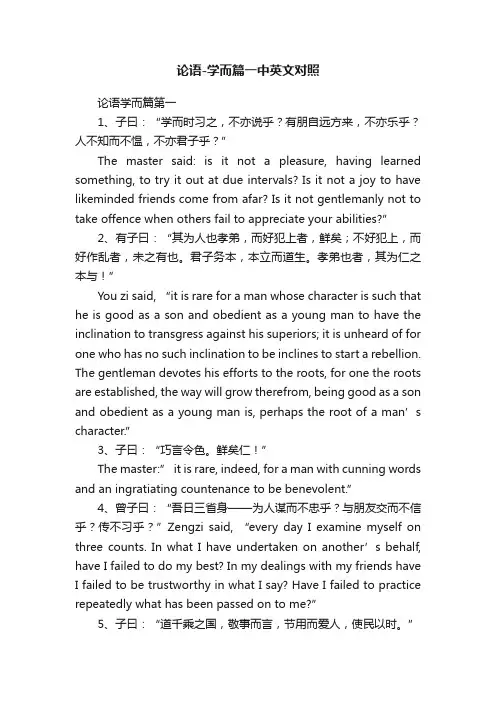
论语-学而篇一中英文对照论语学而篇第一1、子曰:“学而时习之,不亦说乎?有朋自远方来,不亦乐乎?人不知而不愠,不亦君子乎?”The master said: is it not a pleasure, having learned something, to try it out at due intervals? Is it not a joy to have likeminded friends come from afar? Is it not gentlemanly not to take offence when others fail to appreciate your abilities?”2、有子曰:“其为人也孝弟,而好犯上者,鲜矣;不好犯上,而好作乱者,未之有也。
君子务本,本立而道生。
孝弟也者,其为仁之本与!”You zi said, “it is rare for a man whose character is such that he is good as a son and obedient as a young man to have the inclination to transgress against his superiors; it is unheard of for one who has no such inclination to be inclines to start a rebellion. The gentleman devotes his efforts to the roots, for one the roots are established, the way will grow therefrom, being good as a son and obedient as a young man is, perhaps the root of a man’s character.”3、子曰:“巧言令色。
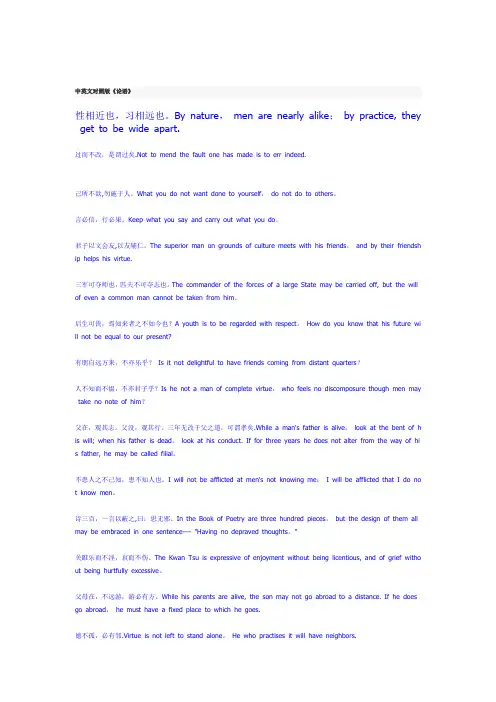
中英文对照版《论语》性相近也,习相远也。
By nature,men are nearly alike;by practice, they get to be wide apart.过而不改,是谓过矣.Not to mend the fault one has made is to err indeed.己所不欲,勿施于人。
What you do not want done to yourself,do not do to others。
言必信,行必果。
Keep what you say and carry out what you do。
君子以文会友,以友辅仁。
The superior man on grounds of culture meets with his friends,and by their friendsh ip helps his virtue.三军可夺师也,匹夫不可夺志也。
The commander of the forces of a large State may be carried off, but the will of even a common man cannot be taken from him。
后生可畏,焉知来者之不如今也?A youth is to be regarded with respect。
How do you know that his future wi ll not be equal to our present?有朋自远方来,不亦乐乎?Is it not delightful to have friends coming from distant quarters?人不知而不愠,不亦君子乎?Is he not a man of complete virtue,who feels no discomposure though men may take no note of him?父在,观其志。
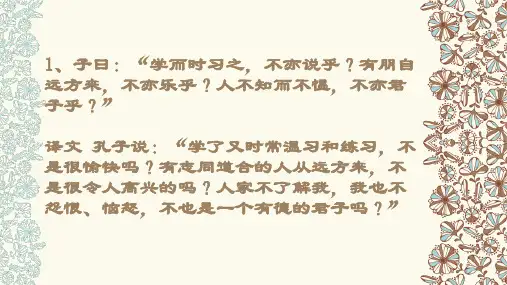
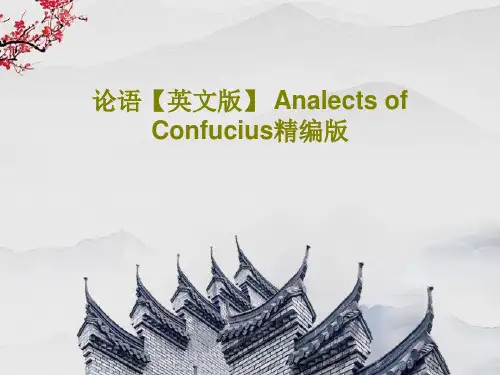
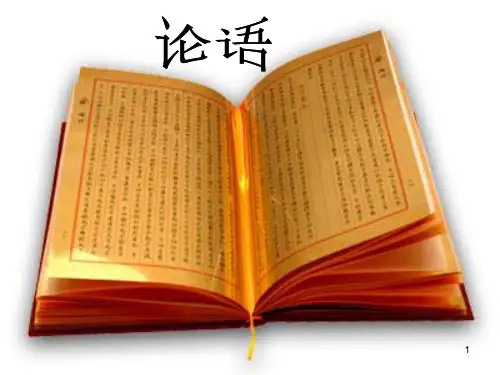
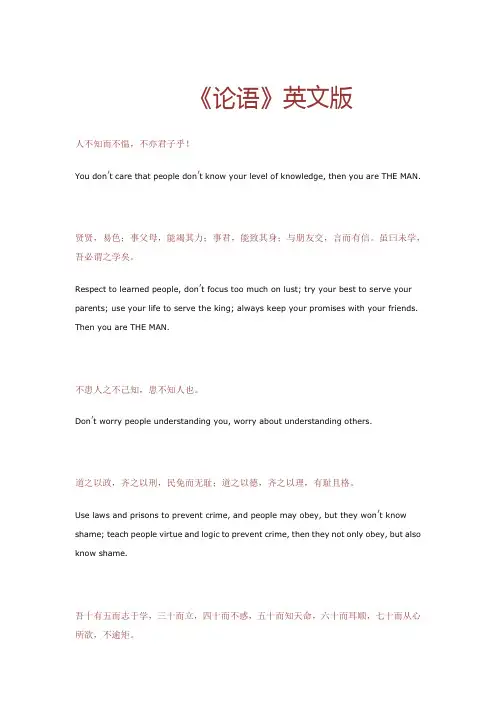
《论语》英文版人不知而不愠,不亦君子乎!You don’t care that people don’t know your level of knowledge, then you are THE MAN.贤贤,易色;事父母,能竭其力;事君,能致其身;与朋友交,言而有信。
虽曰未学,吾必谓之学矣。
Respect to learned people, don’t focus too much on lust; try your best to serve your parents; use your life to serve the king; always keep your promises with your friends. Then you are THE MAN.不患人之不己知,患不知人也。
Don’t worry people understanding you, worry about understanding others.道之以政,齐之以刑,民免而无耻;道之以德,齐之以理,有耻且格。
Use laws and prisons to prevent crime, and people may obey, but they won’t know shame; teach people virtue and logic to prevent crime, then they not only obey, but also know shame.吾十有五而志于学,三十而立,四十而不惑,五十而知天命,六十而耳顺,七十而从心所欲,不逾矩。
I planned to be learned at 15, be independent at 30, be without confusion at 40, get to know the fortune at 50, avoid to be angry at any words at 60, do whatever I want without offending any rules at 70.今之孝者,是谓能养。

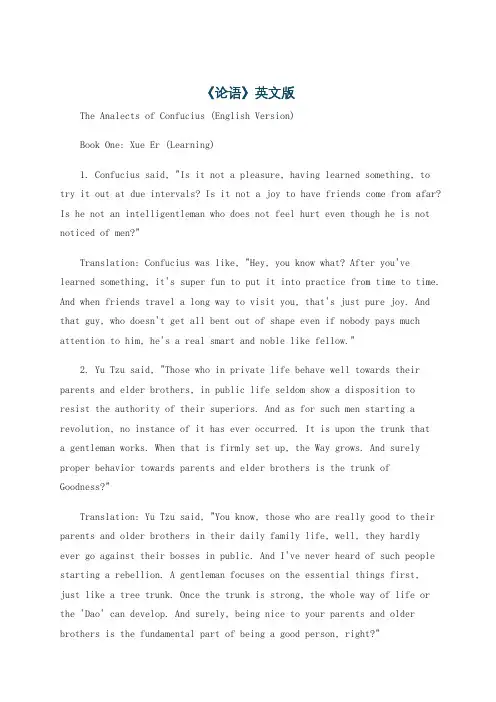
《论语》英文版The Analects of Confucius (English Version)Book One: Xue Er (Learning)1. Confucius said, "Is it not a pleasure, having learned something, to try it out at due intervals? Is it not a joy to have friends come from afar? Is he not an intelligentleman who does not feel hurt even though he is not noticed of men?"Translation: Confucius was like, "Hey, you know what? After you've learned something, it's super fun to put it into practice from time to time. And when friends travel a long way to visit you, that's just pure joy. And that guy, who doesn't get all bent out of shape even if nobody pays much attention to him, he's a real smart and noble like fellow."2. Yu Tzu said, "Those who in private life behave well towards their parents and elder brothers, in public life seldom show a disposition to resist the authority of their superiors. And as for such men starting a revolution, no instance of it has ever occurred. It is upon the trunk thata gentleman works. When that is firmly set up, the Way grows. And surely proper behavior towards parents and elder brothers is the trunk of Goodness?"Translation: Yu Tzu said, "You know, those who are really good to their parents and older brothers in their daily family life, well, they hardly ever go against their bosses in public. And I've never heard of such people starting a rebellion. A gentleman focuses on the essential things first,just like a tree trunk. Once the trunk is strong, the whole way of life or the 'Dao' can develop. And surely, being nice to your parents and older brothers is the fundamental part of being a good person, right?"Book Two: Wei Zheng (The Practice of Government)1. Confucius said, "Guide them by edicts, keep them in line with punishments, and the common people will stay out of trouble but will have no sense of shame. Guide them by virtue, keep them in line with the rites, and they will, besides having a sense of shame, reform themselves."Translation: Confucius said, "If you just boss people around with laws and scare them with punishments, the ordinary folks will avoid getting into trouble, but they won't really feel ashamed of doing wrong. But if you lead them with good morals and make them follow proper etiquettes, not only will they feel ashamed when they do wrong, but they'll also correct themselves."2. Ji Kangzi asked Confucius about government, saying, "What would you think if, in order to move closer to those who possess the Way, I were to kill those who do not follow the Way?" Confucius replied, "In administering your government, what need is there for you to kill? Just desire the good yourself and the common people will be good. The moral character of the ruler is like wind and that of the common people is like grass. In whatever direction the wind blows, the grass always bends."Translation: Ji Kangzi asked Confucius about how to run a government. He said, "Hey, Confucius, what if I killed those who don't follow the right path so that I can get closer to those who are on the right track?" Confucius was like, "Dude, when you're running the government, why do you need to kill? If you just want good things yourself, the common people will be good too. The ruler's moral quality is like the wind, and the common people are like grass. No matter which way the wind blows, the grass will always bend in that direction."。
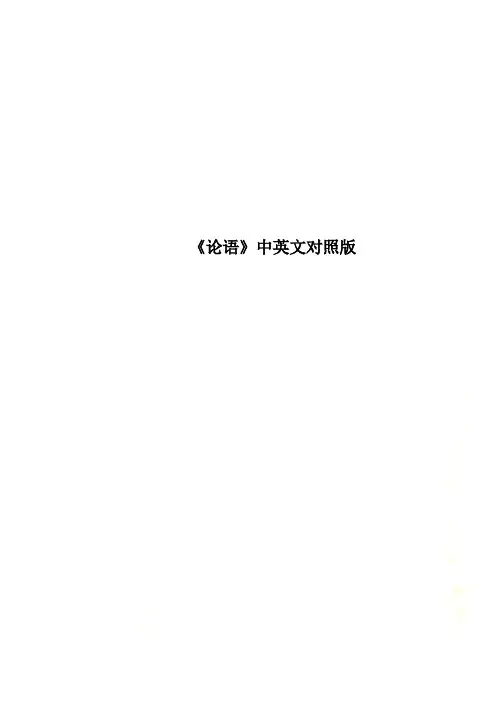
《论语》中英文对照版敏而好学,不耻下问。
He was of an active nature and yet fond of learning, and he was not ashamed to ask and learn of his inferiors.十室之邑,必有忠信,如丘者焉,不如丘之好学也。
In a hamlet of ten families, there may be found one honourable and sincere as I am, but not so fond of learning.知之者,不如好之者,好之者,不如乐之者。
They who know the truth are not equal to those who love it, and they who love it are not equal to those who delight in it.学如不及,犹恐失之。
Learn as if you could not reach your object, and were always fearing also lest you should lose it.『⒈3』子曰:“巧言令色,鲜矣仁!”The Master said, "Fine words and an insinuating appearance are seldom associated with true virtue."『⒈6』子曰:“弟子,入则孝,出则弟,谨而信,凡爱众,而亲仁。
行有余力,则以学文。
”The Master said, "A youth, when at home, should be filial, and, abroad, respectful to his elders. He should be earnest and truthful. He should overflow in love to all, and cultivate the friendship of the good. When he has time and opportunity, after the performance of these things, he should employ them in polite studies."『⒈7』子夏曰:“贤贤易色;事父母,能竭其力;事君,能致其身;于朋友交,言而有信。

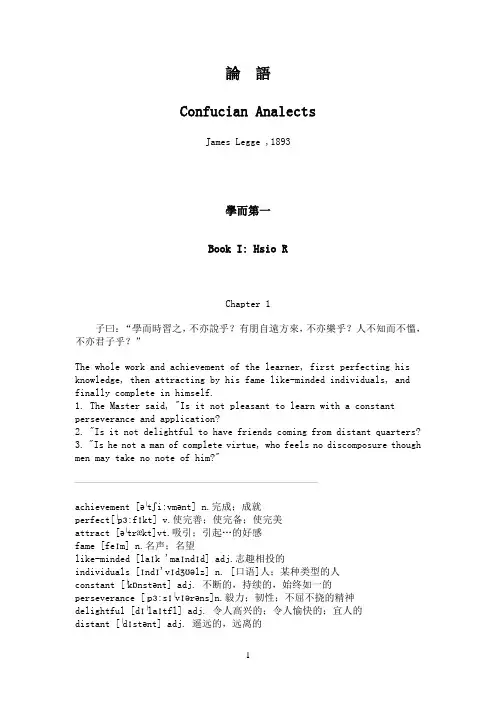
論語Confucian AnalectsJames Legge ,1893學而第一Book I: Hsio RChapter 1子曰:“學而時習之,不亦說乎?有朋自遠方來,不亦樂乎?人不知而不慍,不亦君子乎?”The whole work and achievement of the learner, first perfecting his knowledge, then attracting by his fame like-minded individuals, and finally complete in himself.1. The Master said, "Is it not pleasant to learn with a constant perseverance and application?2. "Is it not delightful to have friends coming from distant quarters?3. "Is he not a man of complete virtue, who feels no discomposure though men may take no note of him?"achievement [əˈtʃi:vmənt] n.完成;成就perfect[ˈpɜ:fɪkt] v.使完善;使完备;使完美attract [əˈtrækt]vt.吸引;引起…的好感fame [feɪm] n.名声;名望like-minded [laɪk 'maɪndɪd] adj.志趣相投的individuals [ɪndɪ'vɪdʒʊəlz] n. [口语]人;某种类型的人constant [ˈkɒnstənt] adj. 不断的,持续的,始终如一的perseverance [ˌpɜ:sɪˈvɪərəns]n.毅力;韧性;不屈不挠的精神delightful [dɪˈlaɪtfl] adj. 令人高兴的;令人愉快的;宜人的distant [ˈdɪstənt] adj. 遥远的,远离的quarter [ˈkwɔ:tə(r)] n. 地区virtue [ˈvɜ:tʃu:] n. 美德;德行;价值discomposure [ˌdɪskəm'pəʊʒə(r)] n. 心乱,不安take note of 注意,留意Chapter 2有子曰:“其爲人也孝弟,而好犯上者,鮮矣。